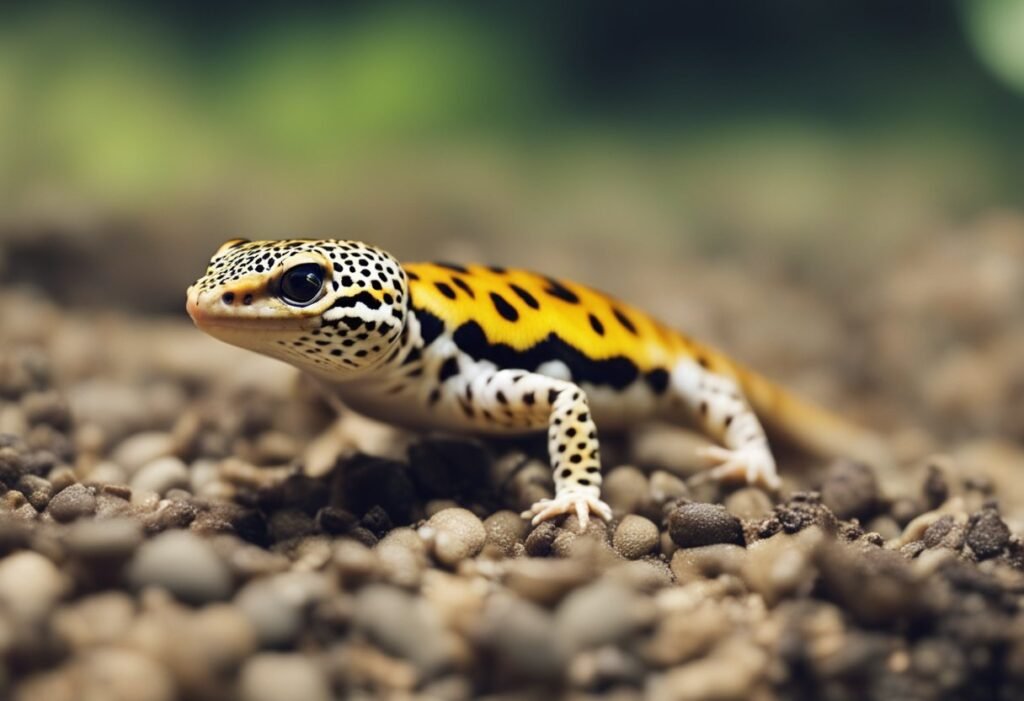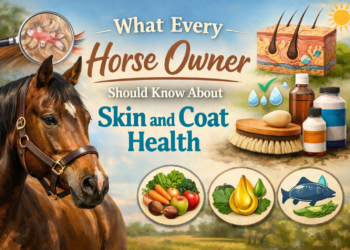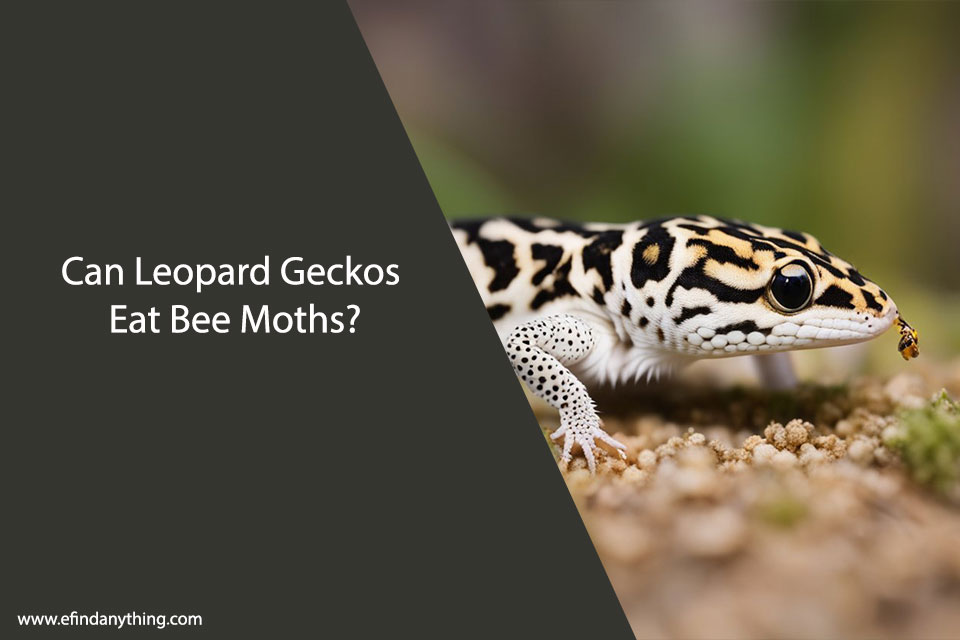Leopard geckos are fascinating creatures that make great pets for those who enjoy reptiles. As with any pet, it’s important to know what they can and cannot eat to ensure their health and well-being. One question that often arises is whether or not leopard geckos can eat beetles.
The answer to this question is not a straightforward one, as it depends on the type of beetle. Some beetles are safe for leopard geckos to consume, while others are toxic and should be avoided. It’s important to do your research and identify the specific type of beetle before feeding it to your gecko.
In this article, we will explore the topic of whether or not leopard geckos can eat beetles. We will discuss the different types of beetles that are safe and unsafe for geckos to consume, as well as the potential risks and benefits of feeding them beetles. By the end of this article, you will have a better understanding of what to feed your leopard gecko and how to ensure their health and happiness.
Dietary Basics for Leopard Geckos

As responsible pet owners, we must ensure that our leopard geckos receive a well-balanced diet that meets their nutritional requirements. In this section, we will discuss the basics of leopard gecko nutrition, including their nutritional requirements and safe foods for them to eat.
Nutritional Requirements
Leopard geckos are insectivores, which means they require a diet consisting of insects and other invertebrates. In the wild, they primarily feed on insects such as crickets, mealworms, and waxworms. However, it’s important to note that not all insects are suitable for leopard geckos to eat.
Leopard geckos require a diet that is high in protein and low in fat. They also require a source of calcium to maintain healthy bones and prevent metabolic bone disease. It’s important to provide a variety of insects to ensure that they receive all of the necessary nutrients.
Safe Foods for Leopard Geckos
When feeding leopard geckos, it’s important to avoid feeding them insects that are too large or too hard for them to digest. It’s also important to avoid feeding them insects that are toxic or could cause impaction.
Here are some safe foods for leopard geckos:
- Crickets
- Mealworms
- Waxworms (in moderation)
- Dubia roaches
- Silkworms
- Phoenix worms
- Butterworms
It’s important to gut-load the insects before feeding them to your leopard gecko. This means feeding the insects a nutritious diet before feeding them to your pet. You can also dust the insects with a calcium supplement to ensure that your leopard gecko receives enough calcium.
In conclusion, a well-balanced diet is essential for the health and well-being of your leopard gecko. By providing a variety of safe foods and ensuring that they receive all of the necessary nutrients, you can help your leopard gecko thrive.
Understanding Leopard Geckos and Insects

Leopard geckos are insectivorous reptiles that require a diet high in protein. In the wild, they hunt a variety of insects to meet their nutritional needs. As owners, it is important to understand their natural prey and hunting behavior to provide them with a healthy and balanced diet.
Natural Prey and Hunting Behavior
Leopard geckos are nocturnal hunters and prefer to hunt at night. Their natural prey includes crickets, mealworms, waxworms, and other small insects. They use their keen sense of smell and vision to locate their prey. Once they spot their prey, they stalk it and pounce, using their sharp teeth to crush and swallow it whole.
As owners, we can replicate their natural hunting behavior by providing live insects for them to hunt. This not only provides them with a stimulating activity but also helps them exercise their hunting skills.
Insect Variety in Captivity
In captivity, leopard geckos can be fed a variety of insects to ensure they receive a balanced diet. It is important to offer a variety of insects to prevent nutritional deficiencies and boredom. Some commonly fed insects include crickets, mealworms, superworms, and dubia roaches.
It is important to gut-load insects before feeding them to your leopard gecko. Gut-loading involves feeding the insects a nutritious diet, which in turn provides your gecko with a more nutritious meal. Dusting insects with calcium and vitamin D3 supplements is also essential to prevent metabolic bone disease.
In conclusion, understanding leopard geckos’ natural prey and hunting behavior is crucial in providing them with a healthy and balanced diet. Offering a variety of insects and gut-loading them before feeding them to your gecko is essential in ensuring their nutritional needs are met.
Feeding Leopard Geckos Beetles

Leopard geckos are insectivores and require a varied diet to maintain their health. While crickets and mealworms are the most commonly fed insects, leopard geckos can also eat beetles. In this section, we will discuss the potential risks and benefits of feeding beetles to leopard geckos as well as preparation and feeding guidelines.
Potential Risks and Benefits
Beetles can be a nutritious addition to a leopard gecko’s diet, but it is important to choose the right species. Some beetles, such as fireflies, are toxic and can be deadly to leopard geckos. It is also important to ensure that the beetles are not too large for the gecko to swallow, as this can cause choking or impaction.
On the other hand, some species of beetles, such as mealworm beetles, are high in protein and low in fat, making them a healthy choice for leopard geckos. Beetles also provide a different texture and taste compared to crickets and mealworms, which can help prevent boredom and encourage feeding.
Preparation and Feeding Guidelines
Before feeding beetles to your leopard gecko, it is important to properly prepare them. This can be done by gut-loading the beetles with nutritious foods such as vegetables or commercial gut-loading diets. Dusting the beetles with a calcium and vitamin supplement is also recommended to ensure that the gecko is getting all the necessary nutrients.
When feeding beetles to your leopard gecko, it is important to monitor their eating habits and ensure that they are not overeating. Leopard geckos should be fed the appropriate amount of insects based on their age and size. It is also important to remove any uneaten insects from the enclosure to prevent the risk of impaction.
In conclusion, feeding beetles to leopard geckos can be a healthy and enjoyable addition to their diet when done correctly. By choosing the right species, properly preparing the beetles, and monitoring feeding habits, leopard geckos can safely enjoy the benefits of this nutritious insect.
Alternatives to Beetles
When it comes to feeding leopard geckos, beetles are a popular choice due to their high protein content. However, if you’re looking to switch up your gecko’s diet or if you’re unable to find beetles, there are other insect feeds that can be used as alternatives.
Recommended Insect Feeds
- Crickets – Crickets are a staple in the leopard gecko’s diet and are readily available at most pet stores. They are high in protein and provide a good source of calcium when gut-loaded with calcium-rich foods.
- Dubia Roaches – Dubia roaches are a great alternative to beetles as they are high in protein and low in fat. They are also easy to digest and have a soft exoskeleton, making them a great option for juvenile leopard geckos.
- Mealworms – Mealworms are another popular choice for feeding leopard geckos. They are high in protein and easy to digest, but should be fed in moderation as they are also high in fat.
Supplementing the Diet
It’s important to supplement your gecko’s diet with calcium and vitamin D3 to ensure they are getting the nutrients they need to stay healthy. Dusting their food with a calcium supplement is recommended, and providing a UVB light source can also help with vitamin D3 absorption.
In addition to insects, leopard geckos can also be fed commercial diets such as Repashy or Pangea. These diets are formulated to provide a balanced diet and can be a good option for those who are unable to provide live insects or want to supplement their gecko’s diet. However, it’s important to note that live insects should still be offered occasionally to provide enrichment and promote natural feeding behaviors.
Monitoring Your Leopard Gecko’s Health

As responsible pet owners, we must ensure that our leopard geckos are healthy and happy. Monitoring their health is crucial, and we must pay attention to any signs of dietary imbalance or illness.
Signs of Dietary Imbalance
Leopard geckos require a balanced diet to thrive. If their diet lacks essential nutrients, it can lead to health problems. Signs of dietary imbalance include:
- Weight loss or gain
- Lethargy
- Abnormal feces
- Weakness or tremors
- Lack of appetite
If you notice any of these signs, it is essential to review your leopard gecko’s diet and make changes as necessary. Consult with a veterinarian if you are unsure about your gecko’s dietary needs.
Regular Health Check-ups
Regular health check-ups are essential to maintain your leopard gecko’s health. During check-ups, a veterinarian can examine your gecko for any signs of illness or injury.
In addition to regular check-ups, we can also monitor our geckos’ health at home. We can do this by:
- Observing their behavior and activity levels
- Checking their skin and eyes for any abnormalities
- Monitoring their weight and growth
- Keeping their environment clean and free of hazards
By monitoring our leopard geckos’ health regularly, we can catch any health issues early and ensure they receive the necessary care.
Frequently Asked Questions
Are beetles a safe dietary choice for leopard geckos?
Yes, beetles can be a safe dietary choice for leopard geckos. However, it is important to ensure that the beetles are appropriate in size and species for your gecko, and that they are not carrying any harmful parasites or diseases. As with any new food item, it is recommended to introduce beetles gradually and monitor your gecko’s response.
What insects should be avoided when feeding leopard geckos?
Leopard geckos should not be fed insects that are toxic or have hard exoskeletons that are difficult to digest. Some examples of insects to avoid include fireflies, boxelder bugs, and ladybugs. Additionally, wild-caught insects should be avoided as they may have been exposed to pesticides or other harmful substances.
Can mealworm beetles be part of a leopard gecko’s diet?
Yes, mealworm beetles can be a part of a leopard gecko’s diet. However, they should not make up a large portion of their diet as they are high in chitin, which can be difficult for geckos to digest. It is recommended to feed mealworm beetles in moderation and provide a variety of other insect options.
Do darkling beetles pose any risks to leopard geckos?
Darkling beetles, also known as superworm beetles, can be a safe dietary choice for leopard geckos. However, it is important to note that darkling beetles have hard exoskeletons and can be difficult to digest. As with mealworm beetles, it is recommended to feed darkling beetles in moderation and provide a variety of other insect options.
Is it safe for leopard geckos to eat superworm beetles?
Yes, superworm beetles can be a safe dietary choice for leopard geckos. However, it is important to note that superworm beetles have hard exoskeletons and can be difficult to digest. As with mealworm beetles and darkling beetles, it is recommended to feed superworm beetles in moderation and provide a variety of other insect options.
Can leopard geckos be harmed by mealworm beetles that can fly?
No, mealworm beetles that can fly do not pose any harm to leopard geckos. However, it is important to note that mealworm beetles with wings are generally older and may not be as nutritious as younger beetles. It is recommended to feed younger mealworm beetles to provide the most nutritional value for your gecko.











